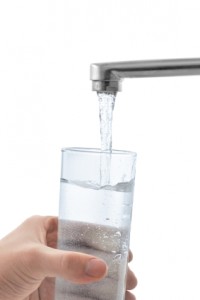EPA to Regulate Rocket Fuel Chemical in Drinking Water
-
-
slice.mit.edu
- 1
Filed Under
Recommended

The recent news that hydrofracking by the drilling industry has been releasing alarming amounts of radioactive waste into rivers and other waterways reminded us at Slice about some other, slightly more uplifting environmental news: The EPA decided to regulate perchlorate!
Perchlorate is both a naturally occurring and man-made chemical that is used to produce rocket fuel, fireworks, flares, and explosives. Primary federal users of perchlorate include the Department of Defense, NASA, and the Department of Energy. In early February, the EPA announced plans to scrap its advisory guidelines--which recommended that the amount of perchlorate in drinking water not exceed 24.5 ppb--in favor of a strict, nationwide mandatory limit, which they say will help protect the estimated five million to 17 million people in the U.S. who consume water containing the chemical. Studies have found that perchlorate can limit the thyroid's ability to absorb iodine and can result in hormonal deficiencies, particularly in pregnant women and children.Former EPA consultant Liz Fechner SM '91 says she is pleased that the EPA will be regulating perchlorate under the Safe Drinking Water Act but notes that "there are still a myriad of chemicals present in our drinking water whose concentrations are not routinely monitored (and thus remain unknown) simply because they are not regulated under SDWA." Indeed the Environmental Working Group, a nonprofit public health organization, analyzed 20 million tap water quality tests between 2004 and 2009 and detected 316 contaminants. The EPA has enforceable standards for only 114 of them.
"Personally, I would like to see more monitoring of hormones and hormone-mimicking chemicals in our water supplies as well," says Fechner.
While the EPA's move has been lauded by environmental activists and health organizations, others are skeptical. The Perchlorate Information Bureau, which includes defense contractor Lockheed Martin and perchlorate manufacturer American Pacific Corporation, contends that perchlorate hasn't shown up in public drinking water at levels that represent a public-health risk. Scientists from the EPA, the National Academies, and many universities--who have contributed to more than 17 years of accumulated science on perchlorate harms--disagree.
It'll be at least a year before the EPA's standards are set into law, and in the meantime California and Massachusetts are the only states that already have enforceable perchlorate standards. If you don't live in those states and you're curious about the safety of your drinking water, check out the EPA's post titled "How will I know if I have perchlorate in my drinking water?"








Comments
Denny
Sat, 07/09/2011 11:15pm
I would imagine that the easiest way to avoid perchlorate in our drinking water would be to use water filter systems. Is this feasible? What are the guidelines for water filters that would filter out perchlorate in our drinking water? If California and Massachusetts currently have enforceable perchlorate standards, I wonder if there are areas in the U.S. that have not yet experienced perchlorate in their drinking water.